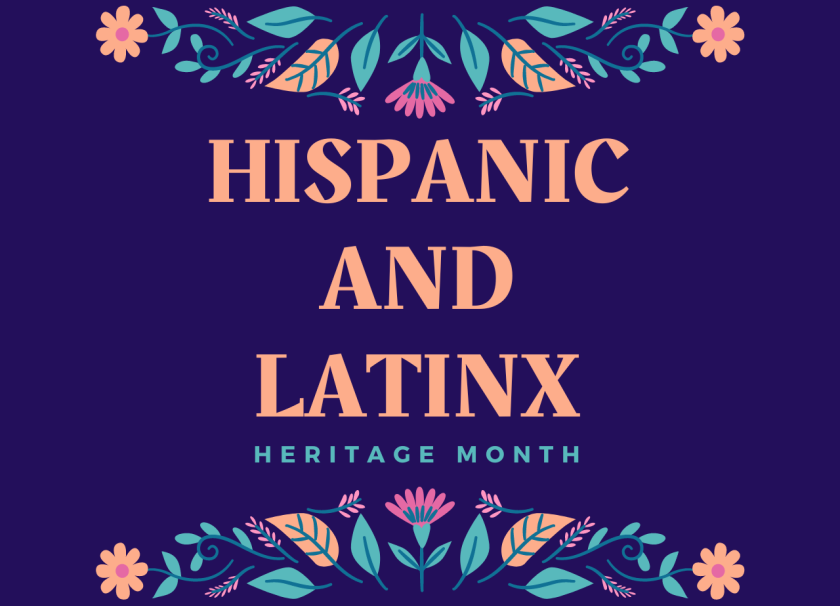
Celebrating Hispanic and Latinx Heritage
September 15th marks the beginning of Hispanic Heritage Month, a time to recognize and celebrate the contributions, diverse cultures, and rich histories of Americans with ancestry from Spain, Mexico, the Caribbean, and Central and South America. At the Ashland Food Co-op, we believe this celebration is not just about acknowledging the past, but also about recognizing the ongoing contributions of Hispanic and Latino (Latinx, Latine) Americans to our community and our food system.
Hispanic Heritage Month, which runs from September 15th to October 15th, was first established as a week-long observance in 1968 and expanded to a month in 1988. The start date is significant as it coincides with the independence days of several Latin American countries, including Mexico, Costa Rica, El Salvador, Guatemala, Honduras, and Nicaragua.
This month-long celebration gives us an opportunity to reflect on the immense impact Hispanic and Latino cultures have had on American society. At the Co-op, we are looking particularly at the realm of agriculture and cuisine. From the introduction of staple crops like corn, beans, and squash to the rich flavors and cooking techniques that have become integral to American cuisine with Hispanic and Latino influences are deeply woven into the fabric of our food systems and culinary landscape.
At the Ashland Food Co-op, we recognize that our food system is strengthened by diversity – in our crops, our farming practices, and most importantly, in the people who bring food from farm to table. Hispanic and Latino farmers and food workers play a crucial role in this system, often working behind the scenes to ensure that fresh, high-quality produce reaches our shelves and your plates.
We believe it's important to shine a light on these contributions, not only to express our gratitude but also to foster a deeper understanding of the cultural heritage behind many of the foods we enjoy every day. By celebrating Hispanic Heritage Month, we hope to encourage our community to explore the rich tapestry of Hispanic and Latino cultures through food, and to recognize the hardworking individuals who make our diverse food system possible.
One notable figure in the history of American agriculture is Cesar Chavez, a Mexican-American labor leader and civil rights activist. Chavez co-founded the National Farmworkers Association (later the United Farm Workers union) and tirelessly advocated for the rights of farmworkers, many of whom were of Hispanic and/or Latino origin.
Chavez's work brought national attention to the harsh conditions faced by farmworkers and led to significant improvements in labor laws and working conditions. His legacy reminds us of the importance of fair labor practices in our food system and the ongoing need to support and respect the people who work hard to bring food to our tables.
One of the best ways to celebrate Hispanic Heritage Month is through food. We encourage our community to explore some of the Hispanic and Latino-owned brands the Co-op carries including Siete, Cocoa and Craft, Rip Van Wafels, Natura, Buenatural, Cacique and more. And it’s always fun to try new recipes and learn about the cultural significance behind different ingredients and dishes.
As we celebrate Hispanic Heritage Month, let's remember that the diversity of our community is our strength. By honoring the contributions of Hispanic and Latino Americans to our food system, we not only celebrate our shared cultural heritage but also work towards a more inclusive and equitable future for all.
Learn more:
https://latino.si.edu/learn/teaching-and-learning-resources/hispanic-heritage-month-resources
More Co-op News
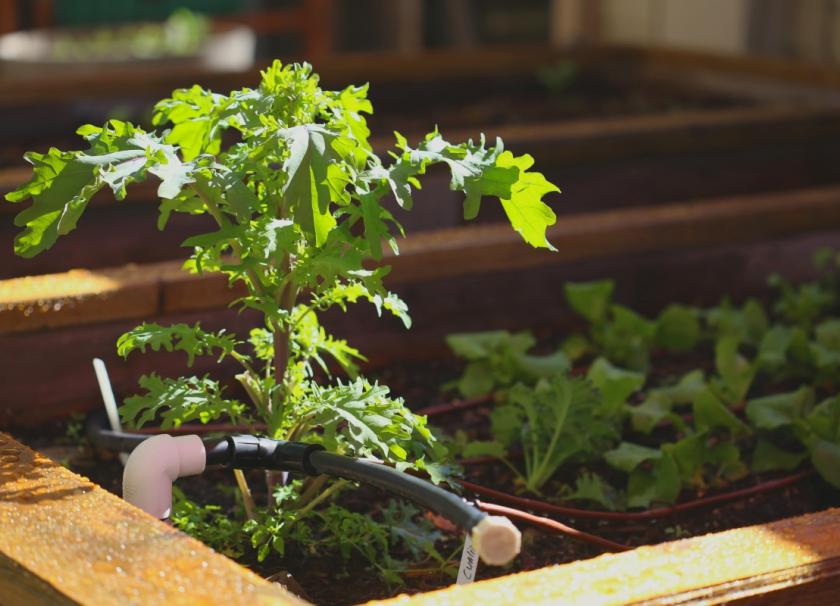
Henry in the Garden: Already Preparing for the Spring
The bane of all gardeners is powdery mildew - that white substance that collects both on the tops and bottoms of the leaves of your healthiest vegetable plants. Cucumbers and zucchini seem to be more easily affected by this scourge than many others.

GM Report: Gratitude for a Great 2019 at the Co-op
It’s the season of gratitude and reflection on the year that has passed, and there is so much to be thankful for as a Co-op owner.
2019 started off with the news that over $13,000 in emergency donations had been raised from Co-op owners and shoppers for support and relief efforts after Paradise, CA was leveled by a wildfire. This outpouring of our support was critical in the months after the fire, after the news trucks had left and the work of rebuilding began. I know how grateful we all are for the much calmer smoke season that our region experienced this summer.
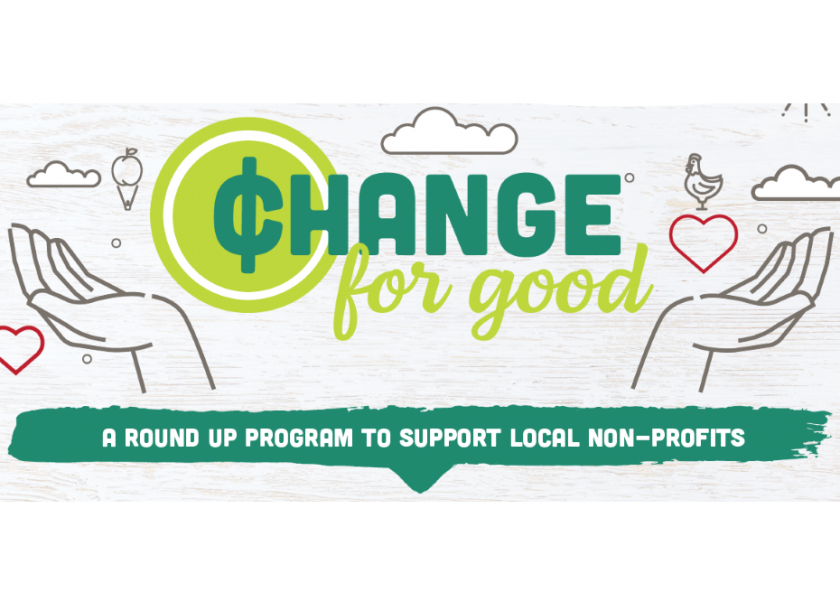
Rounding Up in October
Part of what makes co-ops unique are the guiding 7 Principles of Cooperation. One of the seven that is felt strongly in Ashland is "Concern for the community" - and that's why the Co-op is offering a new way to give back to our community for the month of October. When you pay at the register, you can round up your total to the nearest dollar. For example, $11.68 becomes $12, and $0.32 is donated.

Win 2 tickets to "Chicken Done Simply" cooking class
Find out how fun and educational Co-op cooking classes are! Sign up below for the chance to win two free seats (for you and a friend or loved one) at the next class, "Chicken Done Simply" with the Co-op's own Michelle Guerrie.

Fall Staff Picks
Thanks to alpine trails and shaded valley creeks, outdoor recreation is year-round in the Rogue Valley. But fall usually makes for more frisky feet, so we asked Co-op employees for their favorite fall activities and recommendations for what they grab before they head out.

Applegate products joining Co-op Basics
Just in time for the school year, Applegate products are being added to the Co-op Basics program! The Co-op carries a variety of Applegate products, like sliced deli meat, cheeses, bacon, and sausages. Now as part of the Co-op Basics program, you’ll be saving up to $2 on Applegate products across the store, every day.

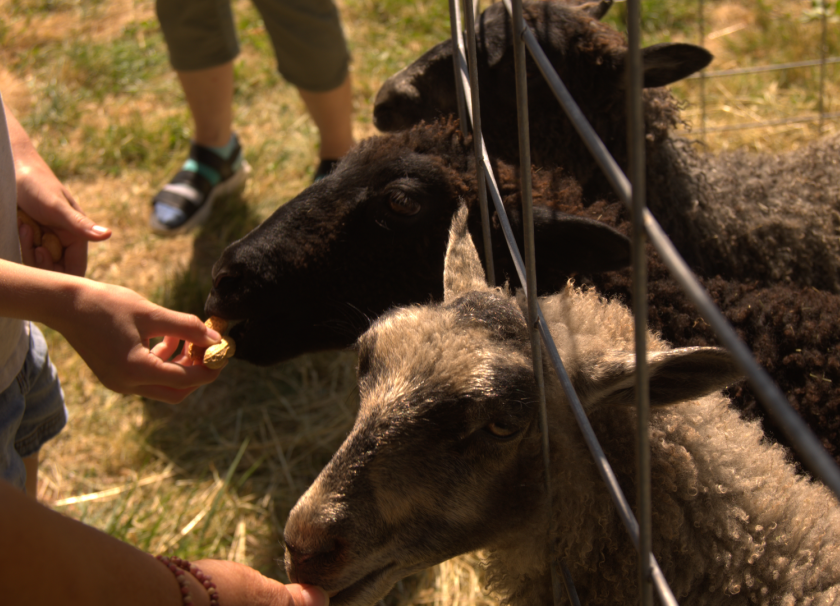
2019 Farm Tour Recap
Another successful farm tour is in the books! With 30 farms this year, visitors could see how bigger farms work, like Herb Pharm, Fry Family Farm, and Rogue Creamery, while also experiencing the joys of smaller farms, such as Turning Point Farm, Fox Run Farm, and Daily Blessing Farm.
Visitors of all ages enjoying Goodwin Creek Gardens
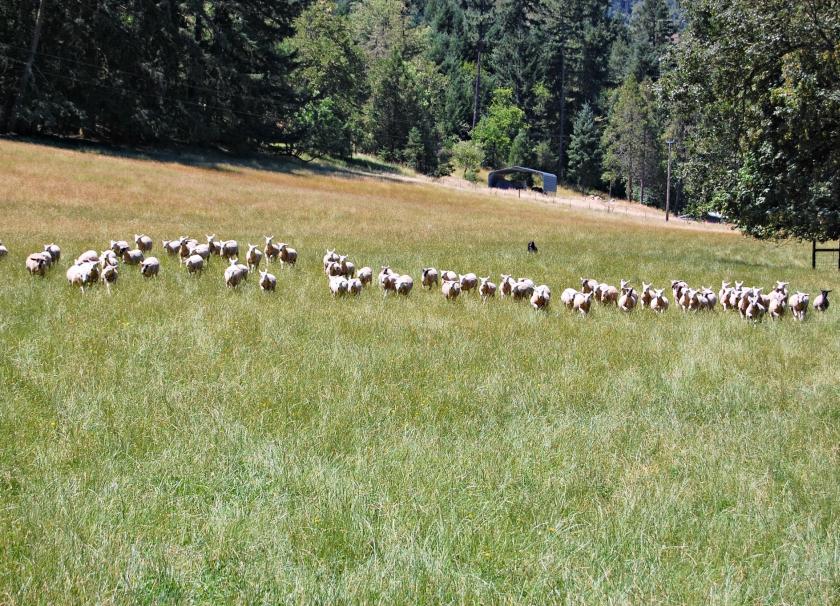
AFC Celebrates 20 Years with Magnolia Farms
This year, the Ashland Food Co-op proudly celebrates their 20 year partnership with Magnolia Farms. Their pasture raised, no antibiotics, no hormones lamb is a staple in the Co-op Meat Department. Magnolia Farms is graciously donating the lamb for our August First Friday in celebration of our long standing partnership.
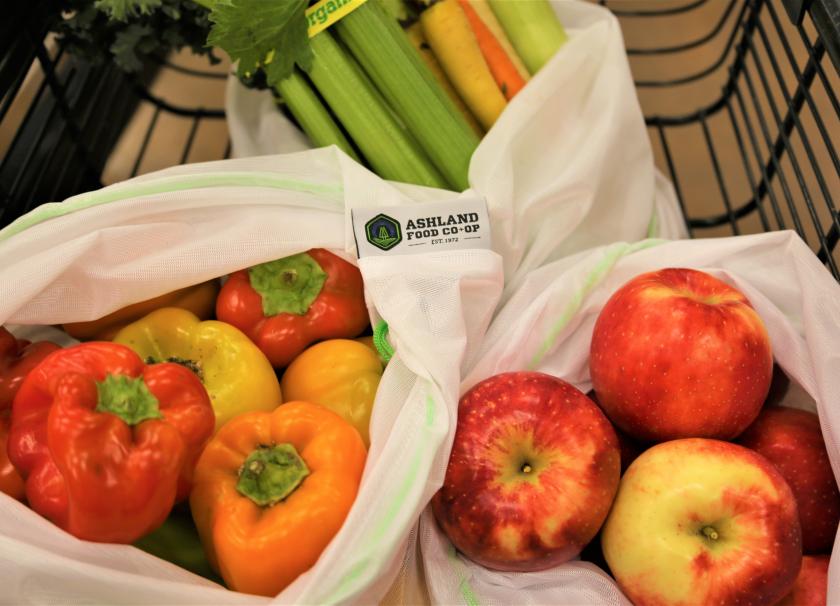
Compostable Bags
The Co-op has been asked if compostable plastic bags are a viable alternative to the standard plastic bags offered in the produce and meat departments.
For several reasons, compostable bags are not in line with the Co-op’s goals and standards.
Not compostable at home
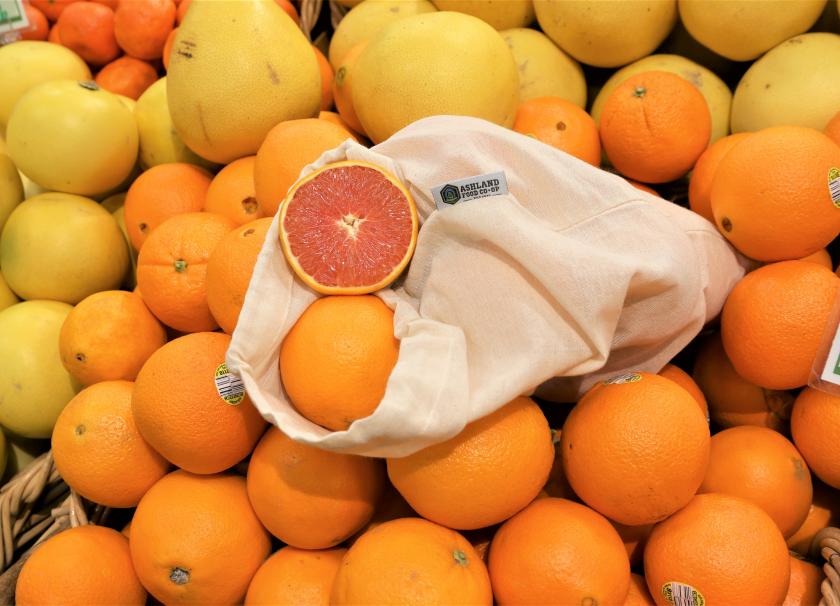
Sustainability Update: Energy efficiency and zero waste
Energy Efficiency
We are happy to announce that we are a member of the Energy Trust of Oregon’s Strategic Energy Management program. This is a free program available to customers of Avista and Pacific Power, which offers awesome incentives including a paid internship!
Community Grant Recipients 2019
The Ashland Food Co-op donated over $29,000 to 28 local nonprofit organizations through their Community Grant Program.
The Community Grant program is the focus of one of the fundamental Cooperative Principles, which all cooperative enterprises follow. Our Community Grant Program supports Principle 7, Concern for Community.

Meet the 2019 Board of Directors
Congratulations to Annie Hoy, Melina Barker, Lisa Beam, and Steve Bowman for their election to the Board of Directors! We were delighted to have such a strong slate of candidates to fill our four vacancies. You can read more about each new director here.

How to stay sustainable with paper products
Have you thought about how sustainable your paper home products are? While the use of single-use plastics has (rightfully) been criticized, some products are made to be single-use - like toilet paper, paper towels, and napkins. With these products, it’s best to examine sustainability by looking at what goes into their production.

2019 Owner Coupon / Benefits Calendar
Hey Co-op owners - if you're wondering if it's a $5 off or 10% discount month... you can reference this calendar.
These benefits are available to all Co-op owners. If you're not an owner yet, you can sign up online!
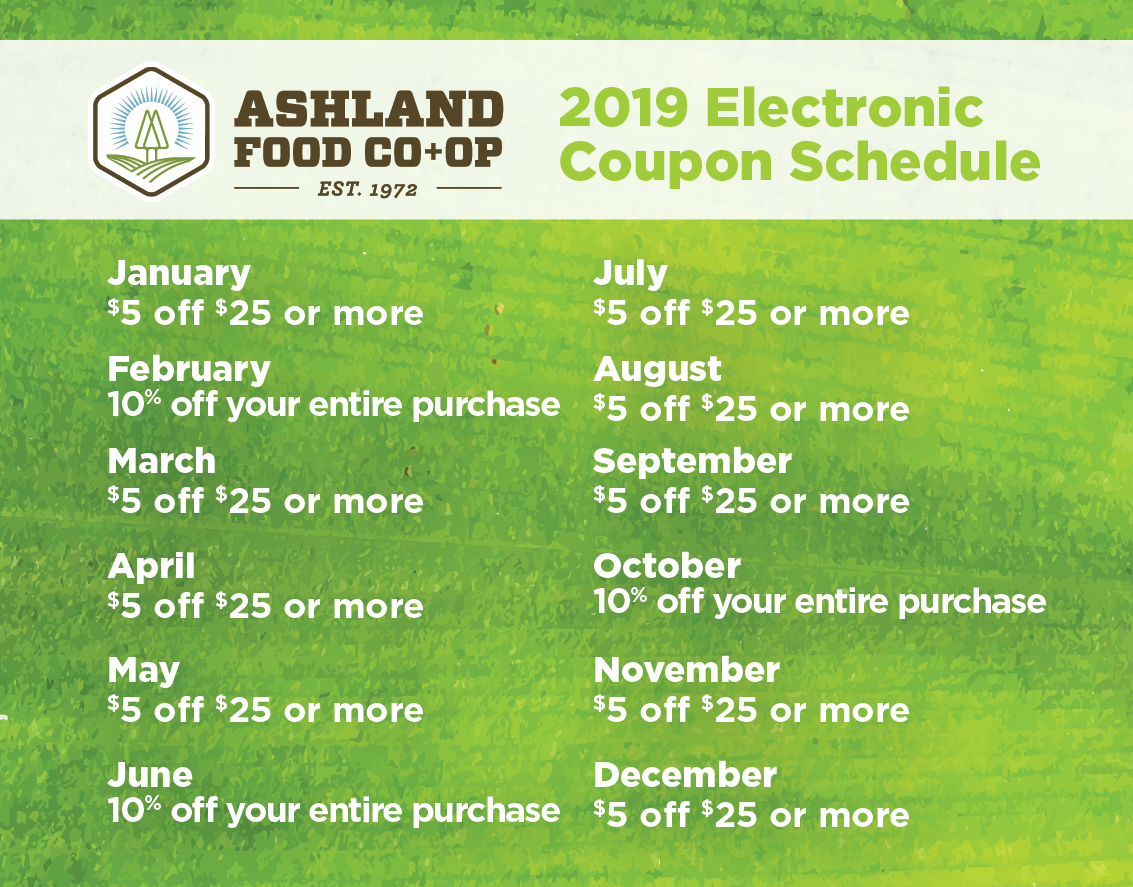
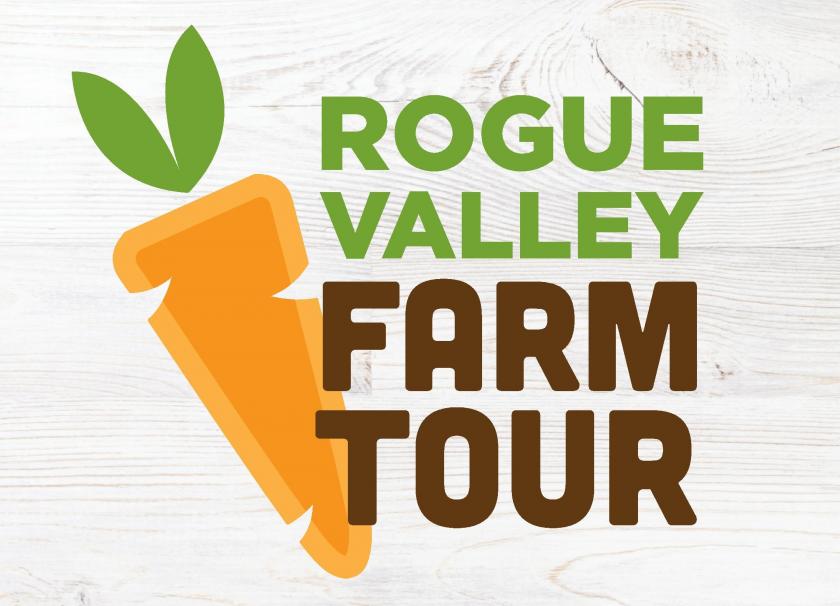
Farm Tour on the Shelves
The Farm Tour shines a spotlight on Southern Oregon - it represents the full range of products grown in the Rogue Valley. The Farm Tour isn't until July 14, but here's a list of tour activities for participating farms that are also on the shelves at the Ashland Food Co-op. Get an early taste of quality local goods!
